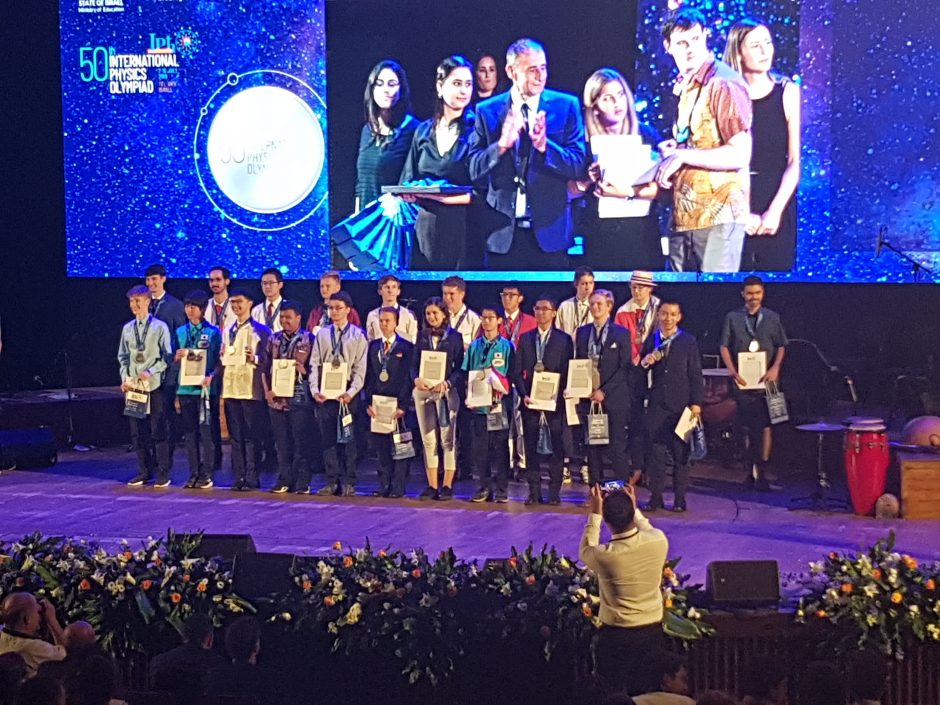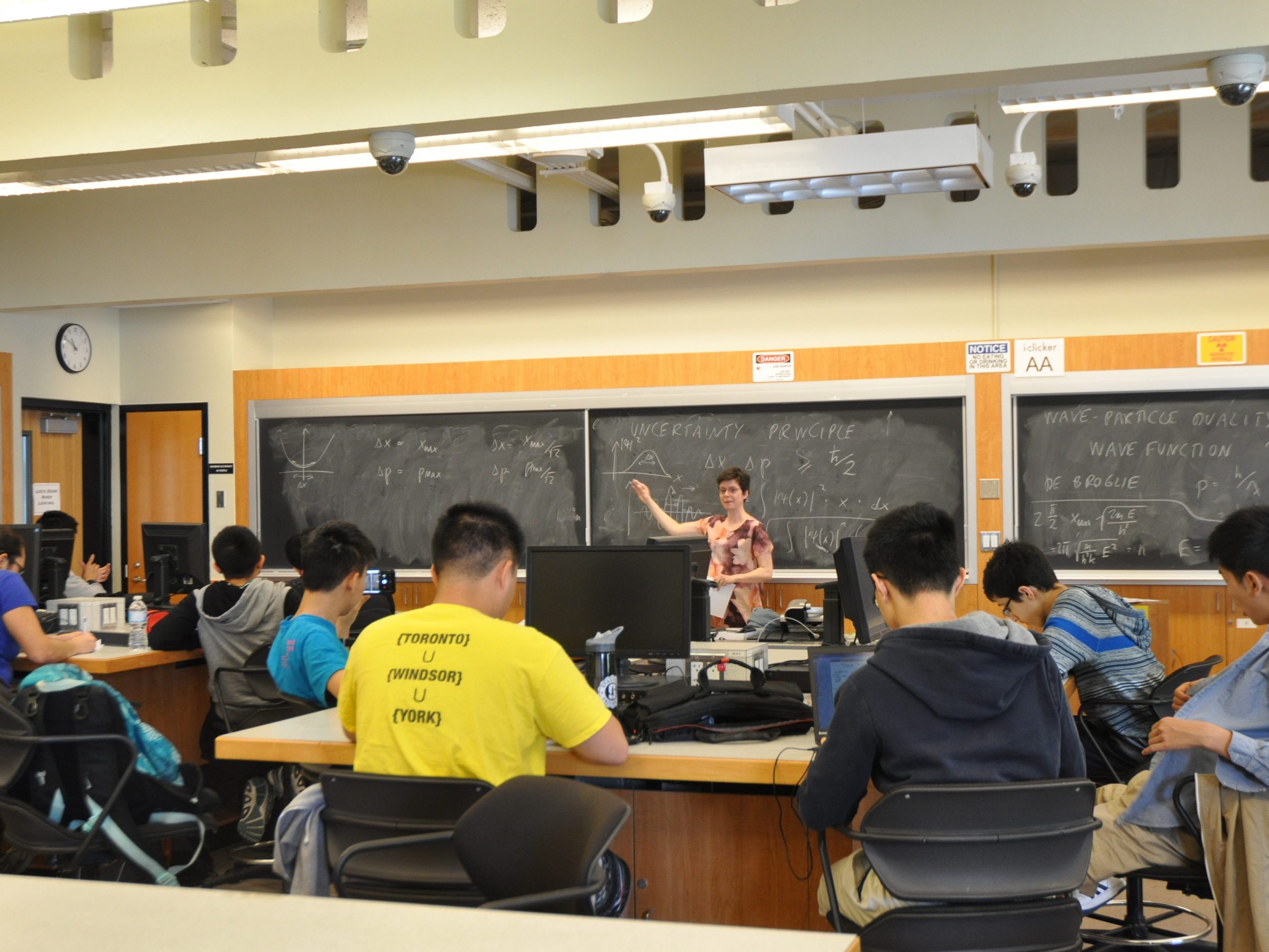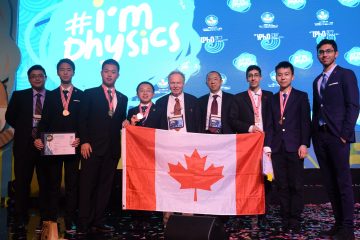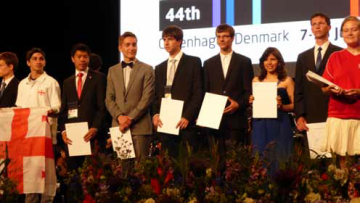Each year, UBC hosts the Canadian Physics Olympiad (CPO) to identify pre-university students who have a talent for physics, and then to prepare the best of them for participation in the International Physics Olympiad (IPhO). Canada has participated in International Physics Olympiad since 1985; it is one of 80-90 participating countries each year. The prestigious national and international competitions require considerable travel and training for competitors, and it is the CPO’s continued belief that each eligible student should have the opportunity to participate regardless of their economic situation.
With your help, we can remove the barrier that might have prevented many gifted students from participating in this unique opportunity to exchange ideas with likeminded students and to represent their country at an international level. It also ensures that students have the best preparation they can receive before facing competitors from other countries, many of which have long-term, dedicated training programs for their students.
You can sign up for a monthly giving program, make a one-time gift, or pay an existing pledge. If you are considering a larger gift to the program, please contact us at outreach@phas.ubc.ca or 604-822-0596 for more information.

Your contribution will help support the following:



Why this experience is important to the students:
Pedram’s experience
This program also provides students with an opportunity to further realize their interests by connecting them with professors and mentors who can provide valuable guidance. My two years of participation in the program connected me with great mentors, many of whom have offered me insight in deciding on an education path to pursue.
Pedram Amani, 2016 and 2017 CPO participant and 2017 IPhO bronze medalist

Pedram (third from the right) with other teammates at the IPhO
Pedram is now an undergraduate student at UBC Physics & Astronomy, and the Co-Captain & Vision Team Lead UBC RoboMaster.
As a participant in the Canadian Physics Olympiad Training Camps 2016 and 2017 and a bronze medalist in IPhO 2017, I would like to briefly outline the significance of this program.
Participants in the program are young bright minds with passion and dedication and they possess high potentials. An early show of support from the Canadian education system, encourages them to pursue their education and ultimately careers in Canada, significantly benefiting Canada’s future in research and other fields. Personally, at the time of participation in the training camp, I was in serious consideration of continuing post-secondary education in the United States, but with guidance and support of the organizers and mentors, ultimately decided to study at the University of British Columbia where I now major in physics.
This program also provides students with an opportunity to further realize their interests by connecting them with professors and mentors who can provide valuable guidance. My two years of participation in the program connected me with great mentors, many of whom have offered me insight in deciding on an education path to pursue.
And finally, the program well prepares students for the IPhO through a week of intense training on theory and experiments. Furthermore, exams conducted during the camp allow for a more accurate selection of the top five students who represent Canada in the IPhO. Advanced training and a better selection of the team have shown improved results for Canada.
Unfortunately, insufficient funding has resulted in numerous cancelations of the national camp in the past, this year included. Further lack of funding would require travel costs to be covered by the students, placing some families under financial pressure. In some cases, students who can pay for their expenses are given preference, which is very unfortunate.
The voluntary team of dedicated professors, graduate and undergraduate students, and past participants eagerly spend their time and resources for organizing this program and your support would help them accomplish their goal of improving physics education in Canada.
Boris’ experience
I was introduced to fascinating ideas and useful equipment that I was not exposed to at my school. The knowledge and skills I gained at the NOF helped me represent Canada successfully at the International Physics Olympiad, receiving a gold medal.
Boris Braverman, 2006 IPhO participant and gold medalist.
Boris is now a Banting Postdoctoral Fellow at the University of Ottawa. His research in the Boyd group focuses on studying the generation, manipulation, and detection of high-dimensional entangled states of light, with applications to quantum imaging and communication.
I participated in the CCPO’s programs both as a student in 2006 and as a mentor in 2009 and 2010. My experience has played a major role in my academic success and career choice. The NOF (National Olympiad Finals) program run by the CCPO brings 20 to 30 of Canada’s brightest students together for a week of intensive training. As a student, I was introduced to fascinating ideas and useful equipment that I was not exposed to at my school. The knowledge and skills I gained at the NOF helped me represent Canada successfully at the International Physics Olympiad, receiving a gold medal. This program, together with the IPhO, revealed science and physics not as static knowledge to be found on the pages of textbooks, but as something alive and exciting to be discovered. My experiences solidified my desire to study physics in university and pursue a research career after previously experiencing much uncertainty regarding my career.
As a mentor, I saw the new generation of students experiencing the same excitement as I did. During my participation as a mentor I realized that physics education is both challenging and important. I was able to share my fascination with physics with very intelligent young people and help them gain a deeper understanding of this subject.
Nearly everyone involved in the CCPO is a volunteer, and most of the funding of the organization goes toward travel expenses for the students to attend training camps and the international Olympiads. For most students I mentored, the funding for travel and accommodation made participation affordable, and many students could not participate at all otherwise. In particular, the funding allows every qualified Canadian student a chance to participate regardless of their financial situation, an essential tool in our quest to cultivate the best minds in Canada.
Unfortunately, funding is a perennial concern for the CCPO, causing program cutbacks and stress for the students and mentors. Fewer and fewer students are invited to the NOF every year, and in the last two years both students and mentors were told that Canada may need to send a smaller delegation of students to the International Olympiads because of funding concerns, which would deny this wonderful experience to many talented students.
I am confident that a small investment today to bring a few extremely bright students together and to allow them to experience this once in a lifetime opportunity will repay itself many times over in the future when these students become Canada’s leading scientists, researchers, and engineers. The programs of the CCPO excite and inspire young people at a crucial time in their lives, when just one positive experience can shape an entire career.
Henry’s experience
I believe the physics Olympiad is important for Canada to participate in…. Students not only have the opportunity to do something they love but also the motivation to learn more in the field of physics a field that has been and will continue to be extremely important.
Henry Wu, 2013 IPhO participant and silver medalist

Henry Wu, third from left, received his silver medal at the closing ceremony.
Henry completed his undergraduate degree at the Massachusetts Institute of Technology.
Most teens don’t read read physics textbooks and solve exam problems in their spare time, but Henry Wu is not most teens. Henry received a silver medal at the 2013 IPhO, Canada’s highest score. While most of his preparation for the IPhO occurred solo, he got extra practice on theoretical and experimental problems in physics classes at school and the University of Toronto’s Physics Olympiad Program (which is no longer running due to funding challenges).
Along with physics concepts, the hard work also taught Henry some life lessons. “Before participating in IPhO, I have always been interested in physics and other sciences,” he says, “But to participate in the Olympiad, I needed to practice a lot and work hard on achieving my goals.”
Even with all of his preparation, the IPhO put his skills to the test. According to Henry, “The most challenging part of the competition was the experiment, which was very lengthy! There were numerous [elements] that I didn’t have time to start.”
Despite the pressure to perform, Henry didn’t lose his appreciation for the pure grace of physics. He says, “The second question, which was on silver nanoparticles, was the most interesting. The problem described how steam could be efficiently generated by illuminating water containing special nanoparticles with light of a specific frequency. The problem used a fairly simple physical model of a spherical nanoparticle in an electric field, but with a beautiful solution.”
Jannis’ experience
I learned that no matter how much you know, there are always more questions, deeper analyses that can be made. This is something that I can apply to my academic endeavors and personal pursuits alike.
Jannis Mei, 2013 IPhO participant and honourable mention.
Jannis Mei is now the CEO at Manifold Data Mining
“My favorite part of participating in the Physics Olympiad was getting the chance to perform experiments. In performing experiments, I was able to see theories and laws come to life,” says Jannis Mei of Toronto, who received an Honourable Mention in the 2013 Olympiad.
“For example, at the National Finals this year, we had the opportunity to examine all the different factors involved with Lenz’s Law. We investigated the effect of resistivity, weight, and friction on the velocity of magnets falling through copper and aluminum tubes,” Jannis explains. This practical experimentation will help Jannis as he embraces his next challenge, life as an engineering student the University of Toronto, with an eye on a career in applied physics or engineering, and, “at the very least, it will be a conversation starter,” he says.
Jannis is proud of Canada’s participation at the Olympiad, and knows that Canada’s Olympiad team can be an important recruiting tool for the best and brightest sciences students from around the world, who can get a small taste of Canada by meeting the students and teachers attending the Olympiad.
In 2013, all of Canada’s Olympians received a medal or an honorable mention. As well as Canada performed, Jannis thinks that with the right investment, we can do better in the future. “Other teams such as Team USA, UK, China, Japan, Macau, Hong Kong, Taiwan, Singapore, Germany, Australia, and Brazil all do at least one week of training in addition to their selection process, and as a result, they do very well, almost always achieving at the Silver or Gold Medal Levels,” he explains. “If Canadians want to compete at this level, we need a similar level of dedication to our students.”